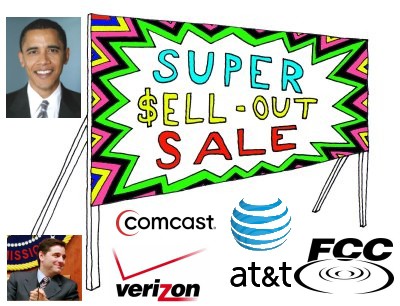
FCC Chairman Julius Genachowski sold President Obama's campaign pledge, his credibility, and you down the river in a sweetheart deal with Big Telecom.
The Federal Communications Commission voted today to pass what Chairman Julius Genachowski called “Net Neutrality” — reforms that will guarantee a free and open Internet. But critics charge any similarity to actual Net Neutrality is purely coincidental.
In a 3-2 vote along party lines, the Democratic Commissioners approved Genachowski’s framework to keep providers from blocking access to websites.
Genachowski claims the rules will protect consumers from providers controlling the free flow of online content and will provide regulatory certainty for the broadband marketplace. Providers, who have either lined up behind the chairman or have muted their criticism of the proposal in recent days, suggest they weren’t about to censor Internet content in the first place and that Net Neutrality is a cause in search of a problem.
Public interest groups were less than satisfied, dismissing today’s proceedings as “Net Neutrality-lite,” or “Net Neutrality with more (loop)holes than Swiss cheese.” In particular, Genachowski’s willingness to exempt wireless broadband from the rules was a very sore spot among Net Neutrality proponents and some in Congress.
“Maybe you like Google Maps. Well, tough,” said Sen. Al Franken (D-Minn.) “If the FCC passes this weak rule, Verizon will be able to cut off access to the Google Maps app on your phone and force you to use their own mapping program, Verizon Navigator, even if it is not as good. And even if they charge money, when Google Maps is free.”
Franken is convinced excluding wireless networks from open Internet rules is the first step towards a free speech calamity.
“If corporations are allowed to prioritize content on the Internet, or they are allowed to block applications you access on your iPhone, there is nothing to prevent those same corporations from censoring political speech.”
Craig Aaron, managing director at Free Press bemoaned today’s vote over rules he suggests were written by the industry itself.
“These rules don’t do enough to stop the phone and cable companies from dividing the Internet into fast and slow lanes, and they fail to protect wireless users from discrimination. No longer can you get to the same Internet via your mobile device as you can via your laptop,” Aaron said. “The rules pave the way for AT&T to block your access to third-party applications and to require you to use its own preferred applications.”
The Obama Administration is likely to claim credit for the new rules and declare Net Neutrality a campaign promise fulfilled, a claim that makes several net activists’ blood boil.
“Chairman Genachowski ignored President Obama’s promise to the American people to take a ‘back seat to no one’ on Net Neutrality,” says Aaron. “He ignored the 2 million voices who petitioned for real Net Neutrality and the hundreds who came to public hearings across the country to ask him to protect the open Internet. And he ignored policymakers who urged him to protect consumers and maintain the Internet as a platform for innovation. It’s unfortunate that the only voices he chose to listen to were those coming from the very industry he’s charged with overseeing.”
Aneesh Chopra, Obama’s chief technology officer said on Dec. 1 that the FCC proposal was an “important step in preventing abuses and continuing to advance the Internet as an engine of productivity growth and innovation.”
Genachowski’s two fellow Democratic commissioners agreed, noting the policies probably don’t go far enough, but it’s a start and they wouldn’t oppose them. But Commissioner Michael Copps made it clear he remains unhappy with how the entire debate was managed. He fears corporate control of broadband content will bring the same mediocrity large corporations have managed to deliver Americans over radio and television.
“I don’t want the Internet to travel down the same road of special interest consolidation and gate-keeper control that other media and telecommunications industries — radio, television, film and cable — have traveled,” Copps said. “What an historic tragedy it would be,” he said, “to let that fate befall the dynamism of the Internet.”
If today’s mild net reforms are a step forward, it’s a small one say critics like the Center for Media Justice. They suggest the FCC’s idea of Net Neutrality offers “minimal protections” for consumers.
 “Our greatest fears have been realized,” said Malkia Cyril, Executive Director of the Center for Media Justice. “The Internet can only work if it’s a truly level playing field. Telecommunications companies have used their considerable wealth and lobbying might to exclude some of the most vulnerable communities from the only protection there is from their corporate abuses. These rules aren’t fair, and they don’t provide a path to equity or opportunity. We’re deeply concerned that today’s vote sends a clear message to our communities that if you access the Internet through your cell phone, you don’t count. The FCC has sadly shirked its responsibility to protect all Internet users equally.”
“Our greatest fears have been realized,” said Malkia Cyril, Executive Director of the Center for Media Justice. “The Internet can only work if it’s a truly level playing field. Telecommunications companies have used their considerable wealth and lobbying might to exclude some of the most vulnerable communities from the only protection there is from their corporate abuses. These rules aren’t fair, and they don’t provide a path to equity or opportunity. We’re deeply concerned that today’s vote sends a clear message to our communities that if you access the Internet through your cell phone, you don’t count. The FCC has sadly shirked its responsibility to protect all Internet users equally.”
All of the debate may ultimately mean nothing should one of the providers decide to challenge the new rules in court. The Commission failed to address an earlier court decision that ruled the Commission’s regulatory framework was based on nothing more than good intentions. The agency was toying with the idea of reasserting authority over broadband using a different framework, but providers furiously lobbied against that, claiming it would “regulate the Internet” under rules designed for landlines. The Commission’s decision to proceed under a foundation condemned by an earlier federal court ruling exposes an obvious weak spot providers could attack in additional lawsuits.
“We know these rules will be hotly contested,” said Betty Yu, MAG-Net Coordinator. “As they roll out, grassroots communities will continue to monitor the process, ensuring that the rights of wireless users are protected from the over reach and abuses of AT&T, Verizon, Comcast and other telecommunications companies. These rules are a compromise- unfortunately, what was lost in the deal are the rights of wireless users.”
Verizon may make things easier for Yu and other consumer groups to clear the playing field and start over again. The company released a statement today that foreshadows a willingness to challenge the agency’s Net Neutrality rulemaking in court (underlining ours):
“While it will take some time for us to analyze the F.C.C.’s rules and the order once they are released, the F.C.C.’s decision apparently reaches far beyond the net neutrality rules it announced today,” the company said in a statement. “Based on today’s announcement, the FCC appears to assert broad authority for sweeping new regulation of broadband wireline and wireless networks and the Internet itself. This assertion of authority without solid statutory underpinnings will yield continued uncertainty for industry, innovators, and investors. In the long run, that is harmful to consumers and the nation.”
<
p style=”text-align: center;”>
The Federal Communications Commission’s Open Meeting introducing Net Neutrality and includes a vote on the rulemaking. (2 hours, 42 minutes)


 Subscribe
Subscribe
Well, I can’t say I’m at all surprised. I’ve pretty much known that the duopolies wealth and ability to use that wealth to buy politicians was going to win the war. However, after reading these new rules, I am left wondering if maybe there is some method to the FCC’s madness? i.e. The duopolies were going to get either caps or the ability to charge websites on the backend to deliver their sites to the consumer. Charging websites on the backend would have been invisible to the average Joe whereas caps are going to be very visible (and very painful… Read more »